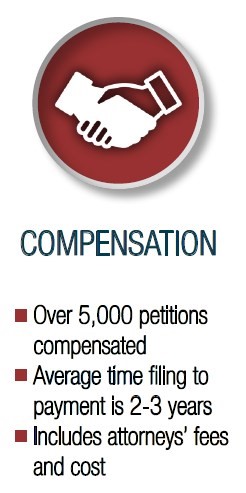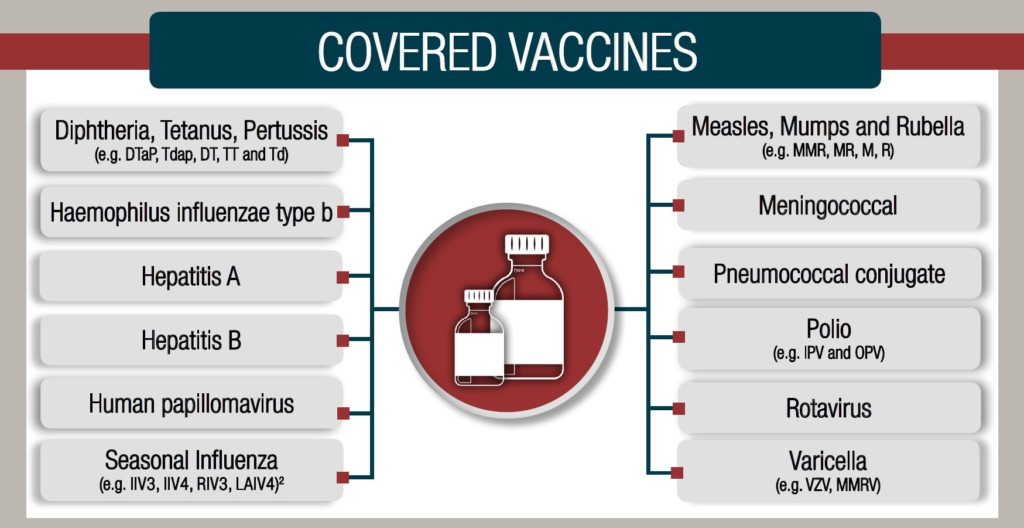
Vaccine Injury Compensation (VICP) Lawyers
Filing a Vaccine Injury Compensation Claim with Confidence
The Vaccine Injury Compensation Program (VICP) is a no-fault alternative to the normal civil court system. The program was set up to provide money to individuals who suffer severe side effects from vaccines. Persons harmed by vaccines or their VICP attorney can file a claim under the program to recover: past medical expenses, all future expected medical expenses, lost income or earning potential, and up to $250,000 for pain and suffering. Families of deceased children or adults can file a claim for death benefits of up to $250,000.
The Vaccine Injury Compensation Program has paid out approximately $3.9 billion to individuals who filed claims, according to the Department of Health and Human Services. The individual awards can be substantial. For example, the family of a vaccinated infant filed a claim for injury caused by the MMR (measles, mumps, rubella) vaccine and received an $101 million award. Another family of a vaccinated baby filed a claim for injury caused by the DTaP (diphtheria, tetanus, pertussis) and received a $61 million award.
The Vaccine Injury Compensation Program also pays out attorneys’ fees separate from the award. If you have VICP lawyer to assist you with filing a claim, their fees wouldn’t come out of your vaccine-injury award. It would be paid separately by the Department of Health and Human Services (HHS).
According to data from HHS, 67.8% of petitioners who file for vaccine-injury receive some form of compensation.
Need a VICP attorney?
Contact us for a free consultation. We’ll keep anything you say confidential. If you receive an award, our attorneys’ fees would be paid by VICP separately from your award.
How to File a Vaccine Injury Claim
The federal government has set up a trust fund for the VICP, which currently has $3 billion in reserve for successful claimants.
To file a claim for vaccine-injury compensation, you need to file a petition with the Vaccine Court requesting a monetary award. The Vaccine Court, which is the informal name for the U.S. Court of Federal Claims, will appoint a special master to adjudicate your claim.
An example of a vaccine-injury petition, adapted from a sample petition provided by the Vaccine Court, can be found here.
In addition to the petition, you’ll also need to send a cover sheet, medical records, other relevant documentation, and a filing fee to the Vaccine Court. Although the Vaccine Injury Compensation Program is designed to be a streamlined and relatively simple process, it is still a legal proceeding.
As the Department of Health and Human Services explains:
The petition [for vaccine-injury compensation] is a legal document that you can prepare yourself or hire a lawyer to prepare and file on your behalf. Because this is a legal process, most people hire a lawyer.
If we take your case, we’ll file the petition and other necessary paperwork, and we’ll pay the filing fee for you. At the end of your case, personal injury attorneyswill request that the Department of Health and Human Services separately pay our attorneys’ fees and costs, separate from any award you’re granted.
Talk to a VICP attorney
How long does it take to get a payout from the Vaccine Injury Compensation Program?
According to the Department of Health and Human Services, it takes an average of 2-3 years from the time of filing a petition to the time of payout. The Vaccine Court is faster than civil court system, according to statistics from the New England Journal of Medicine, which says that the average health-care injury civil case takes 5 years to resolve.

Some vaccine-injury petitions are resolved much faster than others. In many cases, the Department of Health and Human Services will review the petition and concede the case. When there’s a concession, the vaccine-court case moves immediately to the damages phase, in order to calculate how much the petitioner is owed for lifetime medical and caregiver costs, lost income, and pain and suffering.
HHS historically had decided to resolve the case by concession in 17.5% of past cases, according to data from the Department of Health and Human Services.
HHS says it will concede the Vaccine Court case when:
based on a thorough review and analysis of the evidence, including medical records and the scientific and medical literature, … it is more likely than not that the vaccine caused the injury or the evidence supports fulfillment of the criteria of the Vaccine Injury Table.
The Vaccine Injury Table provides a list of vaccines, injuries, and the timeframes in which those injuries must occur for the petitioner to be entitled to a presumption that the vaccine was the cause of the injury. HHS will typically resolve the petition by concession if the injury fits into the Table’s criteria.
If my petition succeeds, how much of a payout am I likely to get from VICP?
Based on data from HHS (from 2006 to 2016), the average (mean) award from the Vaccine Injury Prevention Program was $1.04 million. Results may differ greatly, however, based on the severity of the vaccine injury, or whether it resulted in death.
Death benefits are capped at $250,000, and psychological distress damages (pain and suffering) is capped at $250,000. There is no cap on the VICP award to pay for a lifetime of medical bills or caregiving, or lost wages.
What types of vaccine injuries qualify for VICP compensation?
The Department of Health and Human Services has a Vaccine Injury Table. If your injury falls into the type and timeframe laid out in the table, it is presumed by the Vaccine Court that your injury was caused by the vaccine. HHS can try to argue there was another cause for the injury, but will often concede the petition if your injury (or that of a loved one) fits into the criteria of the Vaccine Injury Compensation Table.
Definitions of Compensable Vaccine Injuries
| Injury | Definition |
| Anaphylaxis | An acute and potentially lethal allergic reaction. For an official diagnosis, the allergic reaction must involve 2 or more organ systems (e.g. cirulatory, lymphatic, digestive, muscular, nervous systems).
Symptoms typically begin within minutes to a few hours after exposure. Death, if it occurs, is frequently caused by swelling up of the throat (laryngeal edema) or tightening of airways (bronchospasm). Other reactions can include: low blood pressure (hypotension), abnormally slow or fast heart beat (brachycardia or tachycardia), shortness of breath (dyspnea), or bluish skin (called “cyanosis,” indicating insufficient oxygenation of the blood). |
| Encephalopathy | An altered mental state.
For children under 18 months: a significantly decreased level of consciousness. For older children and adults: a significant change in mental status (such as a confused state, delirium, or psychosis), and a decreased level of consciousness. Generally, to be compensable, you must be able to rule out medication as a possible cause of the altered mental state (e.g. you don’t take any regular medications, or the medications you take don’t have encephalopathy listed as a side effect). |
| Encephalitis | A swelling or inflammation of the brain, often resulting in flu-like symptoms (such as fever or headache).
Encephalitis is identified with evidence of neurological dysfunction plus evidence of inflammation in the brain. Neurological symptoms include: difficulty speaking or understanding language (aphasia), inability to read (alexia), inability to write (agraphia), and partial blindness or visual-field defects. Evidence of swelling in the brain can include: fever over 100.4 F, abnormal MRI, or abnormal spinal tap (lumbar puncture) results. |
| Intussusception | A bowel onbstruction or intestinal blockage, caused by a section of the intestine folding in on itself.
Onset of symptoms often includes: abdominal pain, anguished crying, vomiting, or blood in stool. |
| Chronic arthritis | Swelling or inflammation of the joints, such as in the hands or feet, causing chronic pain lasting more than six months. |
| Brachial neuritis | Pain or loss of function in the nerves connecting the brain or spinal cord to the muscles in the upper body.
The condition usually begins with a deep, steady, and often severe aching pain in the shoulders and upper arms. The pain is typically followed within days or weeks with weakness in the affected upper extremity muscle groups, causing motor deficits. Brachial neuritis is compensable whether it occurs on the same side as the vaccine injection, the opposite side, or is bilateral (on both sides). |
| Thrombocytopenic purpura | Rare blood condition characterized by clotting in the small blood vessels (thromboids), causing excessive bruising or bleeding, and low platelet count. |
| Shoulder injury resulting from vaccine administration (SIRVA) | Significant shoulder pain or loss of range of motion, caused by damage to the muscoskeletal structures of the shoulder (such as the tendons or ligaments). |
| Vasovagal syncope | Loss of consciousness (fainting) due to a temporary loss of blood flow to the brain.
Also known as the “common faint,” vasovagal syncope is usually a relatively benign condition, according to HHS, but it can result in injuries from falling or other serious medical complications. |
| Guillain-Barré Syndrome (GBS) | A rare autoimmune disease where the body’s own immune system attacks the nerves.
Guillain-Barré Syndrome often begins with tingling and weakness in the feet and legs, which spreads to the upper body and arms. In about half of people with the disorder, symptoms begin in the arms or face, according to Mayo Clinic. As Guillain-Barré syndrome progresses, muscle weakness can evolve into paralysis. Paralysis of the lungs can lead to inability to breath without machine assistance, or death. |
<
Chart of the Vaccines Covered by VICP

Have an injury listed on the VICP compensation table?
Do I have to bring my claim for vaccine injury in Vaccine Court?
Typically, yes. You need to file a petition with the Vaccine Court for compensation from the federal government, instead of suing the vaccine manufacturers. One major goal of the Vaccine Injury Compensation Program is to reduce suits against vaccine manufacturers for rare but foreseeable vaccine reactions. If a petition is denied by the Vaccine Court, in some circumstances the injured individual may then file a civil court claim.
Filing in Vaccine Court is said to be “no fault” as compared to the normal civil court system because under tort or medical malpractice law, you would normally be required to show that the vaccine manufacturer was at fault in some way for the injury (for example, that the manufacturer was negligent or could have made the vaccine safer). In contrast, Vaccine Court does not require a showing of fault. It just requires proof that the injury was caused by the vaccine, not something else.
Proof of causation would be required in a typical civil case, in addition to showing fault.
Do I need a VICP lawyer to file a claim for vaccine injury?
No, you don’t have to hire a VICP attorney to file a petition for vaccine-injury compensation.
HHS says:
You do not need a lawyer to file a claim. However, since this is a legal process, most people use a lawyer. If certain minimal requirements are met, the VICP will pay your lawyer’s fees and other legal costs related to your claim, whether or not you are paid for a vaccine injury or death.
Because filing a VICP petition can get complicated and there are certain documents you can include to increase your chance of a quick resolution and payout, it may be advisable to retain a VICP lawyer rather than braving the process on your own.
What are the deadlines for filing a claim with the Vaccine Injury Compensation Program?
The Vaccine Injury Compensation Program requires for alive individuals, that a petition be filed within 3 years of the onset of the first symptom of the vaccine injury. For dead individuals, a petition must be filed within 4 years of the first symptom and within 2 years of death.
Learn More about VICP Claims
Our Vaccine-Injury Lawyers
Eric Gibbs
A founding partner at the firm, Eric has negotiated groundbreaking settlements that favorably shaped laws and resulted in business practice reforms.
View full profileAmy Zeman
Amy has built a reputation in the plaintiffs’ bar for delivering results to consumers and sexual assault survivors in class actions and mass torts.
View full profileSteve Lopez
Steve represents consumers, employees, and whistleblowers harmed by corporate misconduct in a variety of complex litigation cases.
View full profileAbout Us
Our VICP attorneys can help
Contact us for a free consultation.




